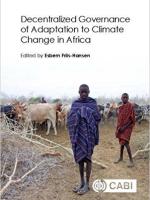New CABI book: Decentralized Governance of Adaptation to Climate Change in Africa
Climate change hazards are a real part of the rural people’s life in Africa. Gradual climate change increases variability of weather patterns and reduces the predictability of agricultural seasons, whereas extreme climate change events take the form of severe floods or prolonged droughts. While everyone is affected, the poor are more vulnerable and suffer most from climate change. Autonomous adaptation by individual households is largely inadequate and there is an urgent need for collective adaptive solutions planned and implemented through inclusive governance at the level of climate change action.
Understanding the institutional conditions and dynamics of how subnational governments engage with climate change is crucial because local governments are best situated to implement international and national policies and programmes in practice. Yet, very few fieldwork-based studies have examined how subnational institutions respond to climate change. This book addresses this knowledge gap. Most chapters in this book are an outcome of the Climate Change and Rural Institution (CCRI) studies that were undertaken 2012–2016 with the aim to examine how a range of subnational institutions respond to climate change in Africa and Asia. Although programme findings have been presented and published elsewhere (Cristoplos et al., 2016), this book presents and reflects on CCRI research findings from Africa.
The book come at a highly appropriate time, as the international community after long negotiations have reached an agreement at COP 21 in Paris 2015 for a roadmap for financing support for climate change adaptation. Focus has now shifted on how to take action and implement the agreement in practice. However, only a few national and international programmes have yet to engage with the subnational government level in Africa in a serious way. It is the hope that this book can contribute to enhance our understanding of the institutional dynamics of how local governments respond to climate change and that can be useful for future support for creating an enabling environment for rural climate change adaptation in Africa.
DIIS Experts


